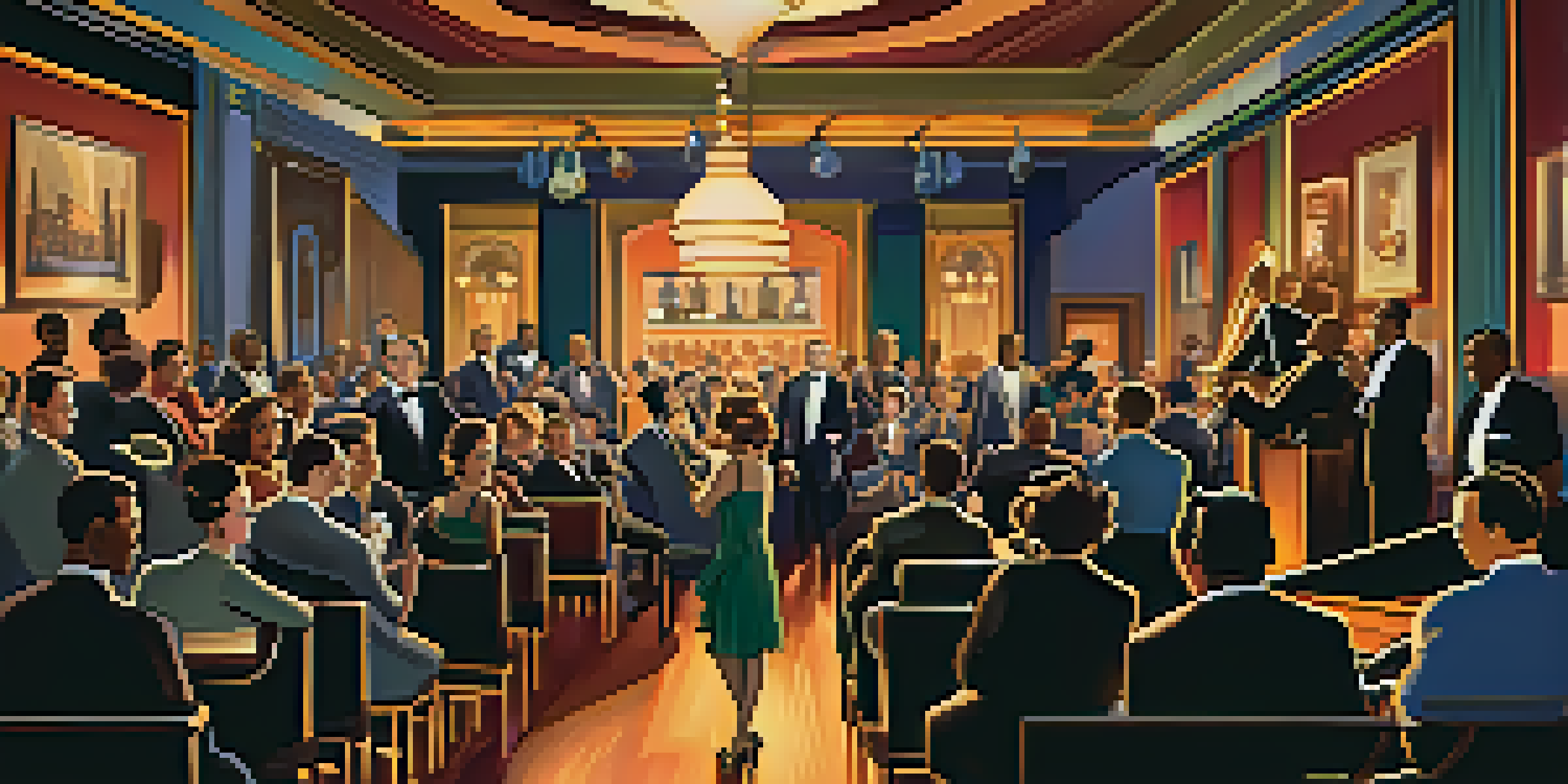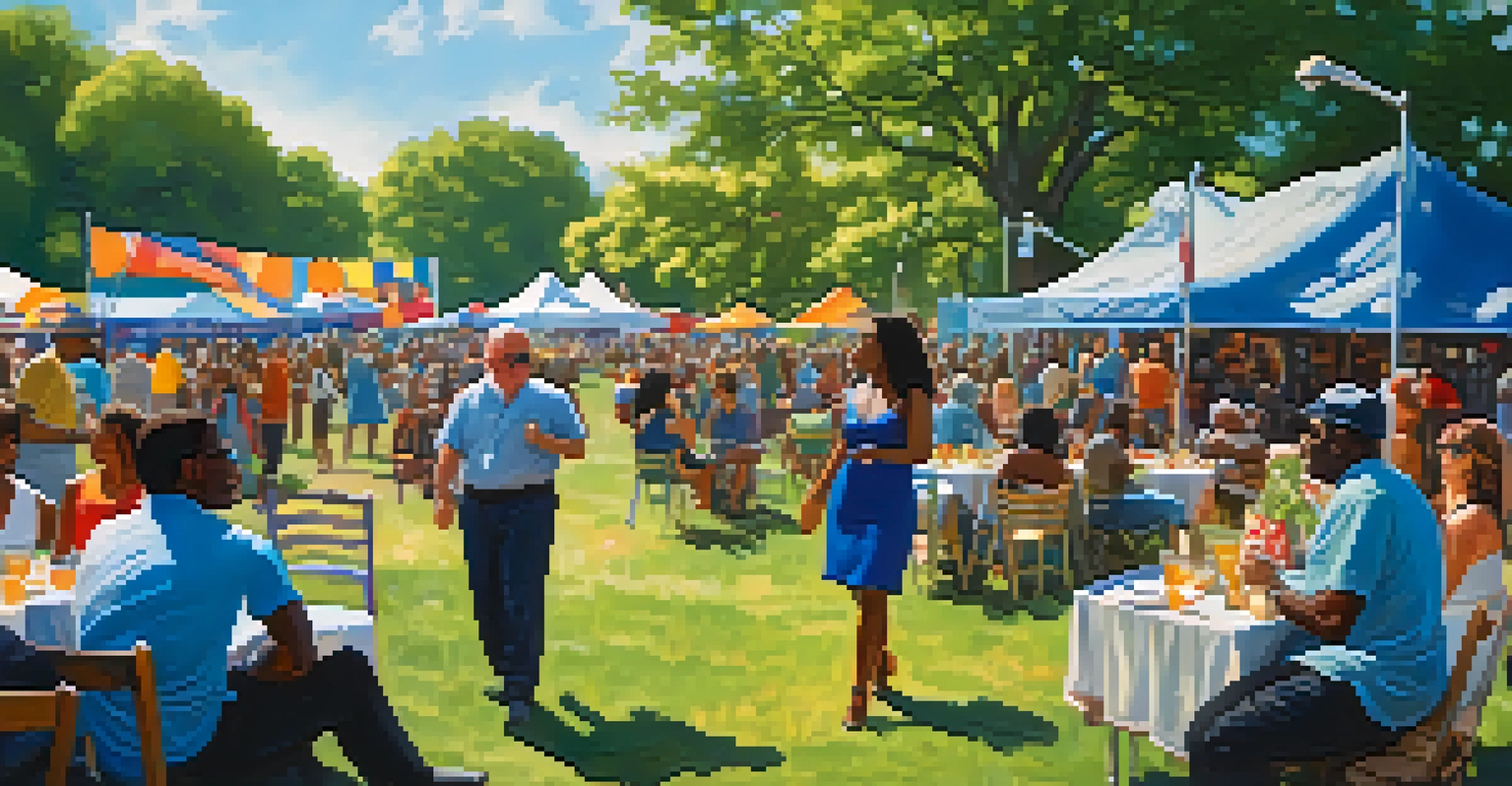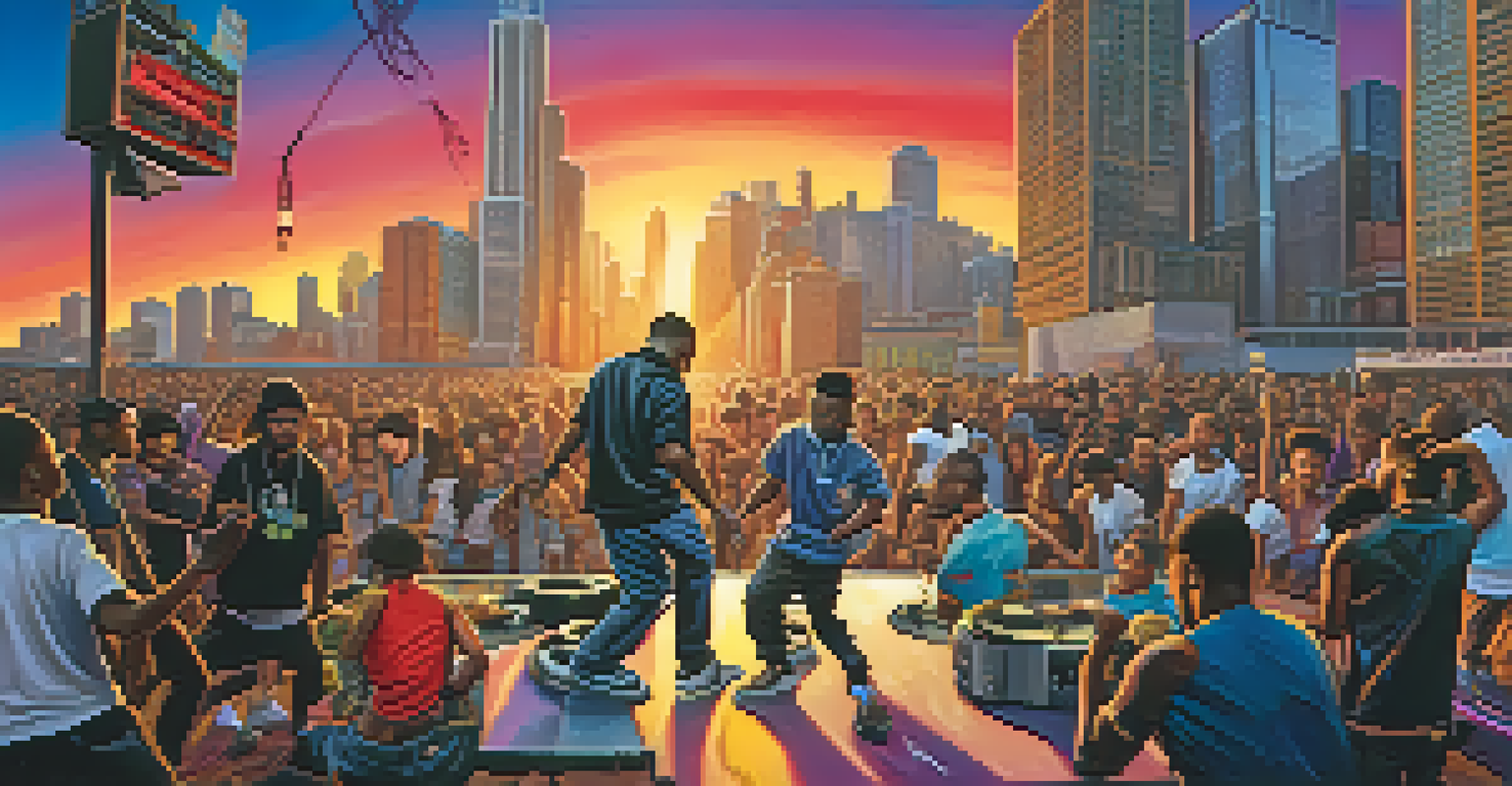Chicago's Influence in American Music History

The Birthplace of Blues: Chicago's Musical Roots
Chicago is often hailed as the birthplace of the modern blues genre, a powerful musical style that emerged in the early 20th century. This city became a melting pot for musicians, especially those who migrated from the rural South, bringing their rich musical traditions with them. Clubs and juke joints in neighborhoods like the South Side became hotspots for blues performances, allowing artists to showcase their talents to eager audiences.
The blues is a simple music, it’s a feeling, it’s a mood, it’s a way of life.
One iconic venue that encapsulates this blues renaissance is the legendary Kingston Mines, where the sound of electric guitars and soulful vocals still resonate today. Musicians such as Muddy Waters and Howlin' Wolf played pivotal roles in popularizing the blues in Chicago, influencing countless artists across the nation. The raw emotion and storytelling of the blues not only defined a genre but also laid the groundwork for future American music styles.
The blues scene in Chicago also gave rise to sub-genres like Chicago blues, characterized by its use of amplified instruments. This evolution demonstrated how the city could adapt traditional sounds into something fresh and exciting, ensuring that its musical legacy would endure for generations to come.
Jazz: The Windy City’s Rhythmic Revolution
Chicago played a crucial role in the development of jazz, a genre that blossomed in the early 20th century. After the Great Migration, many African American musicians settled in Chicago, bringing with them the syncopated rhythms and improvisational styles that defined jazz. Venues like the Grand Terrace and the Regal Theater became essential stops for jazz legends, fostering a vibrant scene that attracted talent from across the country.

One of the most notable figures in this era was Louis Armstrong, who brought his innovative trumpet playing and charismatic stage presence to the Chicago jazz scene. His influence helped shape the sound of jazz, making it more accessible and popular among diverse audiences. As a result, Chicago became known as a hub for jazz innovation, where artists could experiment and push the boundaries of the genre.
Chicago: Birthplace of Blues
Chicago's vibrant blues scene, fueled by Southern migrants, shaped the genre's evolution and laid the groundwork for American music.
The city’s jazz scene also inspired the creation of influential festivals and institutions, such as the Chicago Jazz Festival, which continues to celebrate this rich heritage. These events not only honor the past but also inspire new generations of musicians, ensuring that Chicago remains a vital part of the jazz narrative.
The Rise of Gospel Music in Chicago
Chicago has been instrumental in the development of gospel music, a genre that combines spiritual themes with vibrant musical expression. In the early 20th century, the city became a refuge for many African Americans seeking a better life, and their faith was often expressed through song. Churches like the Apostolic Church of God became crucibles for gospel innovation, with choirs that would captivate congregations and beyond.
Jazz is not just music, it’s a way of life, it’s a way of being, a way of thinking.
Artists such as Mahalia Jackson and Thomas A. Dorsey, often referred to as the 'Father of Gospel Music,' emerged from Chicago, bringing gospel to mainstream audiences. Their powerful voices and heartfelt lyrics resonated deeply, bridging the gap between sacred and secular music. This cross-pollination of styles not only enriched gospel music but also influenced other genres like soul and R&B.
Today, Chicago's gospel scene continues to thrive, with annual events like the Chicago Gospel Music Festival showcasing the city’s enduring spiritual and musical legacy. The genre's emotional depth and community focus remain a testament to Chicago's incredible influence on American music history.
Rock and Roll: Chicago's Electric Contribution
As the 1950s rolled in, Chicago became a significant player in the rock and roll scene, blending various musical influences into a new, electrifying sound. The city’s rich blues heritage served as a foundation, with artists like Chuck Berry and Buddy Guy fusing rock with the emotional intensity of the blues. This melding of styles resonated with audiences and helped define the rock music landscape.
One notable venue that contributed to this vibrant scene was the famed Chess Records, which launched the careers of many rock legends. The company's innovative approach to recording and promoting artists allowed Chicago to become a pivotal center for rock music. Songs like 'Johnny B. Goode' not only showcased the city's talent but also helped catapult rock and roll into the cultural mainstream.
Jazz and Cultural Innovation
The city became a jazz hub in the early 20th century, attracting legendary musicians and fostering a rich cultural scene that influenced future generations.
Chicago's influence on rock continued to grow with the emergence of bands like The Chicago Transit Authority (now known as Chicago) and the rise of the punk rock scene in the late 1970s. These developments ensured that Chicago's musical spirit remained dynamic and ever-evolving, making it a cornerstone of American rock history.
House Music: Chicago’s Beat Revolution
In the 1980s, Chicago emerged as the birthplace of house music, a genre that would go on to dominate dance floors worldwide. This electronic music style was born in clubs like The Warehouse, where DJs began experimenting with mixing disco and electronic beats. The infectious rhythms and repetitive melodies created a euphoric atmosphere that captivated partygoers and musicians alike.
Pioneers such as Frankie Knuckles and Ron Hardy played a crucial role in shaping house music, using their skills to create tracks that pushed the boundaries of traditional music. Their innovative use of synthesizers and drum machines brought a fresh sound that resonated deeply within Chicago’s nightlife. House music became a cultural phenomenon, influencing not only local artists but also shaping the global electronic music scene.
Today, house music remains deeply embedded in Chicago's culture, with festivals like Chicago House Music Festival celebrating its rich legacy. The genre's focus on community, dance, and self-expression continues to thrive, demonstrating how Chicago’s musical innovation can create lasting impacts on a global scale.
Hip-Hop: The Windy City’s Rhythmic Revolution
Chicago has also made significant contributions to the hip-hop genre, particularly since the 1990s. The city’s unique blend of influences has given rise to distinct styles and voices that have shaped the hip-hop landscape. Artists like Common and Kanye West have not only gained national acclaim but have also helped to define what it means to be a Chicago rapper.
The city's hip-hop scene is characterized by its lyrical depth and social commentary, often reflecting the realities of life in urban environments. This authenticity resonates with audiences and has allowed Chicago artists to carve out a unique space within the broader hip-hop community. Collaborations between local musicians and national stars have further bolstered Chicago's reputation as a hub of hip-hop creativity.
Diverse Music Scene Legacy
Chicago's eclectic music scene, encompassing genres like gospel, rock, and hip-hop, reflects its cultural diversity and continues to inspire creative innovation.
Events like the Chicago Hip-Hop Festival serve to highlight the city's vibrant culture and the diverse voices within it. As new artists continue to emerge, Chicago’s legacy in hip-hop remains strong, proving that the city is a vital part of America’s musical tapestry.
The Cultural Melting Pot: Chicago's Diverse Music Scene
What truly sets Chicago apart is its diverse music scene, a reflection of the city’s rich cultural tapestry. From blues to gospel, jazz to house, and hip-hop to rock, each genre tells a story and contributes to the overall narrative of American music. This diversity has allowed Chicago to become a breeding ground for innovation, where artists draw inspiration from multiple influences to create something uniquely their own.
Local festivals, such as Lollapalooza and the Chicago Blues Festival, celebrate this eclectic mix, showcasing a wide array of talent from different genres and backgrounds. These events not only highlight the city’s musical heritage but also serve as platforms for emerging artists to share their voices and connect with audiences. Chicago’s commitment to fostering musical diversity is evident in its support for both established and up-and-coming musicians.

As the city continues to evolve, so does its music scene, reflecting the changing dynamics of culture and society. Chicago remains a vital center for musical exploration, ensuring that its influence on American music history will only continue to grow.
Legacy and Future: Chicago's Musical Journey Continues
Today, Chicago's influence on American music is undeniable, with its rich history serving as a foundation for future generations. The city’s ability to adapt and innovate has allowed it to remain relevant in the ever-changing musical landscape. As new genres emerge and artists experiment with different styles, Chicago continues to play a pivotal role in shaping the sound of tomorrow.
Music education programs and community initiatives are vital in nurturing young talent, ensuring that the city remains a hub for musical creativity. Organizations dedicated to supporting local musicians and preserving Chicago's musical heritage are essential for fostering the next wave of artists. This commitment to education and community engagement will keep the city’s rich musical traditions alive for years to come.
As we look to the future, Chicago’s musical journey is far from over. The city’s vibrant scene promises to inspire new sounds and movements, further solidifying its place in American music history as a source of innovation and artistic expression.